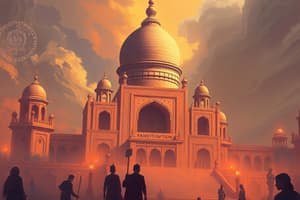Podcast
Questions and Answers
What is the formal source of all constitutional laws in India?
What is the formal source of all constitutional laws in India?
- The Indian Constitution (correct)
- The Executive branch
- The Legislature branch
- The Judiciary branch
What is the significance of the division of sovereign powers among the Executive, Legislature, and Judiciary in the Indian Constitution?
What is the significance of the division of sovereign powers among the Executive, Legislature, and Judiciary in the Indian Constitution?
- It ensures no encroachment upon powers belonging to other organs (correct)
- It provides for an unlimited government
- It concentrates all powers in the Executive branch
- It allows each branch to exceed its powers defined by the Constitution
Why can't the Parliament in India be considered a sovereign Legislature like the British Parliament?
Why can't the Parliament in India be considered a sovereign Legislature like the British Parliament?
- It has limited powers defined by the Constitution (correct)
- It is subordinate to the Executive branch
- It is not mentioned in the Indian Constitution
- It has unlimited authority over the Constitution
Flashcards are hidden until you start studying
Study Notes
- The Indian Constitution is a written document that serves as the supreme law of the land.
- It establishes a limited government with sovereign powers divided among the executive, legislature, and judiciary.
- No organ of government can exceed the powers granted to it by the Constitution.
- The validity of laws enacted by the legislature is determined by the Constitution, and cannot violate any provision of it.
- The Indian Parliament is not a sovereign legislature, as supremacy lies with the Constitution itself, which is the paramount law of the land.
Studying That Suits You
Use AI to generate personalized quizzes and flashcards to suit your learning preferences.




